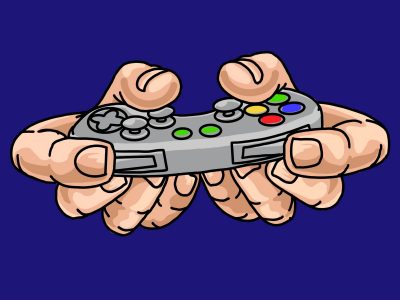When you’re playing video games alone at home, it’s very easy to fall victim to “tilt,” a lesson that I have learned the hard way. The state of tilt, a term originating from poker, is one in which your own frustration at previous losses or mistakes makes you play worse. It’s a vicious cycle — a close loss or unlucky break makes you lose, and then your worsened mental state makes you lose more, repeating until you either squeak out a win or finally decide to call it a night.
In my experience, solo queuing — queuing up for rounds of a video game without any of your friends on your team — makes it especially easy to tilt because there is no one for you to vent your frustrations to, cheer you up or to strategize with. In spite of that, it used to be the main way I played some of my favorite competitive games like Overwatch. I got much more out of games, however, when I finally found other ways to play.
Super Smash Bros. is usually played one-on-one, so in a sense every time you play online is solo queuing, but the difference between online and offline gameplay still helped my mentality greatly. I finally began to attend in-person tournaments regularly at the beginning of the school year. The advent of COVID-19 vaccines and the return to campus made it feasible for the BU Smash Society to hold them again.
When I play the game alone in my room, at times I feel myself getting frustrated at losses. I tell myself that I was actually the better player, that I was only losing to my opponent’s slow internet connection or their use of what I believed were unfair tactics.

In real life, however, it’s somehow impossible for me to get tilted. I’m not exactly sure why, but it probably has something to do with the fact that I can put a name and face to my opponent. Exchanging pleasantries, “good games” and a fist bump after we play reminds me that it’s just a game and that we respect each other as competitors. I can also hear and see them deftly pressing buttons on the controller, quelling the thought that they’re secretly less skilled than me.
As far as my play is concerned, the amicable mentality of real-life matches has helped me improve, and the game feels better without the lag of playing online. I’ve also made many friends in the scene and seen more of the city as I’ve attended tournaments at Northeastern, the Colleges of the Fenway, and the nearby internet cafe, Balance Patch.
This semester, I’ve even begun learning how to run Boston University’s tournaments. Setting up a bracket and then seeing lots of people have fun competing and playing friendly matches afterward is just as uniquely rewarding of an experience.
In the first-person shooter game Overwatch, my experience has proven analogous. In the past five years, I’ve sunk many hours into solo queuing Competitive mode in that game, which can be fun in its own right but also a recipe for frustration and disappointment. Again I often found ways to rationalize my losses, usually blaming some of the five teammates assigned to me by the game.
At the end of last year a friend reached out to me asking if I would be interested in joining an Overwatch team around my skill level to play in an amateur league. I had never played in one and was skeptical, thinking that playing Competitive mode alone was enough and unsure if I could perform, but said yes on a whim.
Again, my experience in and out of the game was completely changed for the better. Playing scrimmages against other teams on a regular basis with the same teammates was way more fun than almost any of my randomly matched ranked games. I made internet friends that I still regularly chat with now and also learned many new things about Overwatch.
These two examples are not exactly the same, but to me they demonstrate that even within the relatively narrow confines of competitive gaming it is important to step outside of your comfort zone and try something new.
Don’t just take it from me — it’s common knowledge among players of many titles that solo queue and “scrims” — scrimmages between static teams — are like night and day. One Overwatch player on Reddit wrote that scrimming gives them “a drive that is hard to describe,” but they can barely stand an hour of solo queue.
Additionally, League of Legends players seem to agree that solo queue is good for practicing some skills but cannot compare to more organized play. Even a 2021 study has shown that while in-person tournaments can dampen the mood of those focused solely on winning, they actually improve the happiness of players who want to make friends, play with others and relax.
Queuing up for games of ranked Overwatch or Smash Bros. alone is the path of least resistance. It is easy to do, noncommittal and not social at all. Being willing to take the next step and try a new way to play and meet new people, even if it is unfamiliar and more time-consuming, ends up being well worth it.




















































































































Sonic • Apr 8, 2022 at 1:24 pm
This is a good message and I agree, sometimes I do get a little “tilt”